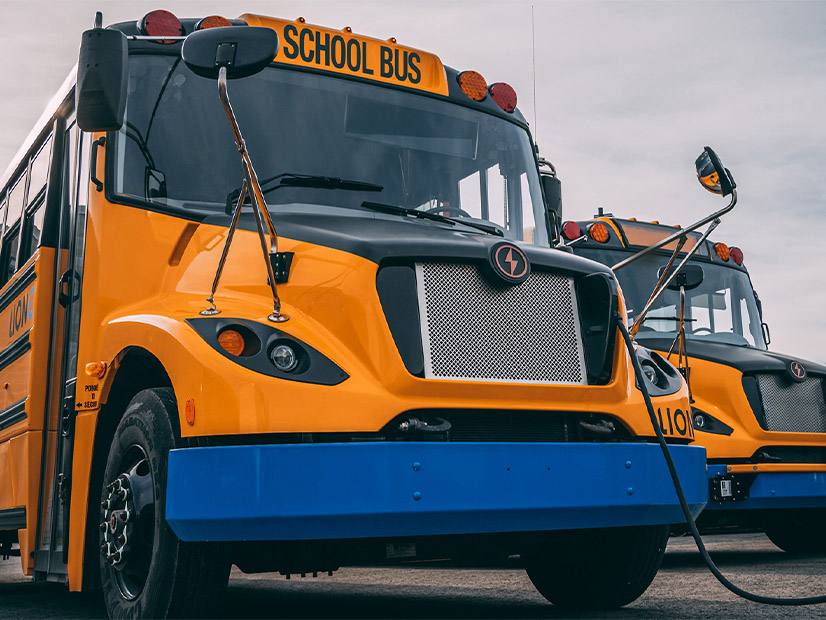EPA on Jan. 8 announced $965 million in grants to purchase almost 2,700 electric buses in 37 states and Washington, D.C. as part of its Clean School Bus Program.
The program, established by the Infrastructure Investment and Jobs Act of 2021, will dispense $5 billion through fiscal year 2026 through rebates and grants. EPA awarded about $875 million in rebates in 2022 for replacing diesel buses with either battery electric, propane or compressed natural gas (CNG) models. (See EPA Awards US School Districts Nearly $1B for Clean Buses.) This week marked the second round of funding.
The new buses will reduce both greenhouse gas emissions and particulate matter that can cause asthma and other maladies. “Every school day, 25 million children ride our nation’s largest form of mass transit: the school bus,” Vice President Kamala Harris said in a statement. “The vast majority of those buses run on diesel, exposing students, teachers and bus drivers to toxic air pollution.”
According to the agency’s data on the awards, 95% of the funds will go toward new battery-powered buses: Of the 2,737 buses to be purchased, only 62 will be propane, and none will be CNG.
EPA said it selected 67 applicants, and that buses will go to 280 school districts, representing about 7 million students. Many of the awardees are districts and county school systems themselves, while others are bus providers and manufacturers acting on schools’ behalf. First Student, which bills itself as the “leading school transportation provider in North America” will receive the largest award — about $140 million for 366 battery electric buses across the country.
First Student CEO John Kenning said the grants will help the company meet its commitment to transition 30,000 diesel buses to electric power by 2035.
Among school districts, the largest awards of about $20 million for 50 buses each went to Boston, Miami, Los Angeles, Chicago, Clayton County, Ga. (south of Atlanta), DeKalb County, Ga. (east of Atlanta), and Beaverton, Ore. (west of Portland).
EPA noted that it will take applications until Jan. 31 for the next round of funding. Awards are expected to be announced in April. It did not say when the next round of grants or the third round of rebates would begin.
Deployment Delays
According to a report by Canary Media last month, awardees of the first round of rebates have been slow to deploy their new buses. According to World Resources Institute data, as of Dec. 29, of the more than 6,000 buses that fleet operators and school districts have committed to, only 1,862 are operating, making up 0.4% of the entire U.S. fleet.
Canary cited installing charging infrastructure — not covered by the rebates — as one of the challenges for districts. Another is needed upgrades to distribution infrastructure by electric utilities, which was the primary concern of EPA’s Office of Inspector General in a report released Dec. 27.
The IG concluded that there were no significant supply chain issues or production delays impacting EPA’s efforts to disburse electric bus funds. “However, the agency may be unable to effectively manage and achieve the program mission unless local utility companies can meet increasing power supply demands for electric school buses.”
The report noted that charging sites for 25 or more buses often require a new transformer — equipment that currently is backlogged.
In a separate report released the same day, the Inspector General criticized EPA for failing to verify information submitted in applications for federal funding, which it said “led to third parties submitting applications on behalf of unwitting school districts, applicants not being forthright or transparent, entities self-certifying applications without having corroborating supporting documentation, and entities being awarded funds and violating program requirements.”
The report noted that EPA focused on whether the supply chain, an issue hampering other clean energy industries, would delay deployment, holding meetings throughout 2022 with bus manufacturers who expressed confidence they could meet demand. The IG agreed with the agency’s finding that production would not be an issue. It found that manufacturers have hired new workers and at least one built a new plant to meet demand.
But EPA did not require applicants in the first round of funding to coordinate with their utilities to see if their systems could handle the new demand for electricity, the IG said. It did note that for the third round of rebates, EPA has required applicants to submit a Utility Partnership Agreement “to verify that the school district’s electric utility provider is aware of the school district’s rebate application.”
“The EPA needs to ensure that utilities have constructed and connected charging stations in a timely manner so that school districts’ school bus fleets … are functional,” the IG wrote.




